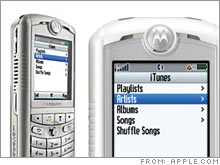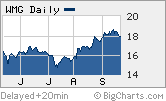Ringtones: The sound of money
The music industry may be in a state of flux but artists and record labels are hoping ringtones can help boost overall sales
NEW YORK (CNN/Money) - The Arctic Monkeys, Britain's latest "it' band, share a pretty amusing take on the current state of the recording industry in the song "A Certain Romance." "There's only music so that there's new ringtones." Cynical? Yes. But there's more than a grain of truth to this lyric. U.S. ringtone sales totaled $500 million last year and should increase to $600 million this year, according to data from songwriter and music publisher trade group BMI. Globally, ringtone sales were $4.4 billion last year, according to Billboard, up from $3.7 billion in 2004. By comparison, the Recording Industry Association of America (RIAA) said that sales of physical CDs, cassettes and videos fell 7.6 percent last year. The phone is the new mix tape
So can ringtones save the music business? They have, after all, grown so popular that even Billboard tracks them. And it's the one area of the business where people appear to be willing to pay a premium price, an interesting twist in an era when many music lovers scoff at paying more than 99 cents to download a song from places like Apple's (Research) iTunes. Ringtones, particularly master tones, which play actual sections from the studio version of a song, often cost between $2.50 and $3.50 to download. Pricing is usually set by carriers, such as Verizon (Research), Sprint (Research) and Cingular, which give a cut to record labels. The record companies are happy for new sources of revenue. EMI Group, one of the world's largest music companies, said that mobile music sales increased nearly 140 percent during the first six months of its most recent fiscal year. Plus, music executives say that ringtones serve as a marketing tool that can help lift sales of singles and albums. "The beauty of ringtones is that they are both a commercial and promotional product in one," said Tom Ryan, senior vice president of digital and mobile strategy and development for EMI Group. "Airplay, if you will, of cell phones ringing in schools, malls and city blocks helps drive sales." Artists are also catching on. Nick Thomas, the 21-year old lead singer and guitarist for The Spill Canvas, a rock band signed to independent label 111 Records, said he's had fans tell him that they first heard the group's music because of friends' ringtones. "People may not own as many physical CDs anymore, but they can go to their friends and say I have this ringtone for my phone," said Thomas. 111 Records has a distribution deal with EastWest, a label owned by Warner Music Group (Research), and ringtones for some of The Spill Canvas's songs are available at the EastWest Web site. Passing fad or ringing in sales for the next few years?
But one wireless analyst said he's not sure how much longer the music industry can depend on strong growth in ringtone sales. David Chamberlain, principal analyst with tech consulting firm In-Stat, said that as cell phone makers like Nokia (Research) and Motorola (Research) start to sell more phones that also serve as digital music players, people might be less likely to want to pay a premium price for a ringtone. "People that were enthusiastically buying ringtones are now buying phones that can play MP3 files. That may help to sweep ringtones aside. I'm not saying ringtones will vanish but I don't see huge growth," Chamberlain said. Michael Nash, senior vice president of digital strategy and business development for Warner Music Group, disagrees. He said that pricing does not appear to be a hindrance. He argues that consumers, particularly teens and young adults, view the ringtone as something that helps identify them. "The ringtone is not just a 30-second snippet. It's like a digital T-shirt," Nash said. Nash added that as phones are able to store more multimedia content, companies like Warner Music Group will work with the wireless carriers to offer even more music options, such as full singles, albums and music videos. So even if users start to balk at paying a high price for a ringtone, they will have other ways to buy music for their phones. And even if prices for ringtones eventually start to fall, Nash thinks music companies will still use ringtones as way to first introduce a cell phone user to a new song...even for more mainstream artists that already have a large following. Warner Music Group last year released "Hung Up," the first single from Madonna's latest album, as a ringtone a month before the song was released to radio stations or available for sale online or in record stores. (For readers under the age of 21, a record store is a place where old fogies like me used to go to back in the 80s and early 90s in order to buy the latest cassettes from our favorite bands. If you want to know with a cassette is, ask your parents.) "We think of the ringtone as the new single. It definitely functions as a buzz builder. It reaches a younger audience effectively," Nash said. EMI's Ryan also thinks this is just the beginning of a steady wave of growth in ringtone sales. "As long as phones ring there will be a market for ringtones," said Ryan. He even jokes that even though most users are now more interested in downloading master ringtones because of the better quality, it wouldn't surprise if there were a pick up in sales of polyphonic ringtones -- basically versions of songs that sound like they are being played on a cheesy Casio keyboard. "There could be a retro comeback because of the kitsch factor," said Ryan. Ah yes. Pining for how things used to be way back in 2004. Those crazy kids. ------------------------------- To check out some of this year's hot new cell phones, click here. Wanna trade in spare change for iTunes gift certificates? Click here.
For more about personal technology, click here. |
| |||||||||||||





